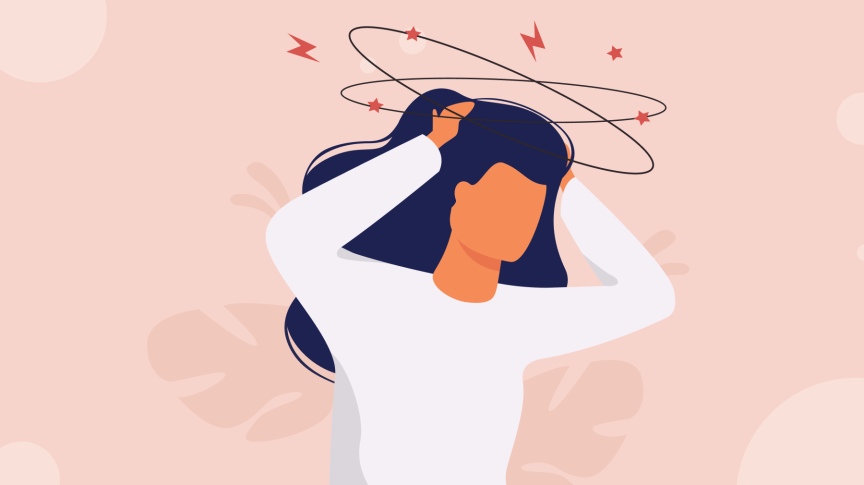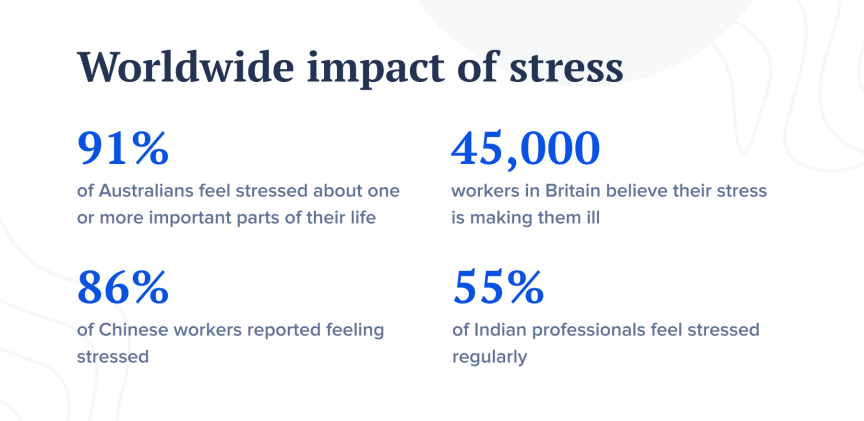Learn why leading HR professionals trust ekincare! Explore Now

The word "stress" does not need any introduction or description. It now probably feels like a part of life. It doesn’t matter to what age group one belongs or the occupation one is in, or even the circumstances, most of us are now experiencing stress.
Stress is a state of mental or emotional strain or tension resulting from adverse or demanding circumstances. Work, personal and social life and even routines like managing household chores have now become sources of stress.
If we look at the amount of information one has access to about stress and stress management, is it safe to assume that one is well aware of stress?
By understanding just how widespread stress is, a person can begin to take action against its effects.
Here, we attempt to provide more insights and a comprehensive overview of stress.
 The worldwide impact of stress
The worldwide impact of stress
Simply speaking, one needs to understand the problem if one is to be able to find a solution!
Comprehending the problem is as important as addressing it. Understanding could simply mean trying and figuring out what is contributing to stress. Is it only our perception, or is it something that happens to us? When stressed, our body (physiologically), mind (cognitively) and the experience of emotions (emotionally) change dramatically. Focusing on this will help differentiate normal responses from various symptoms of stress. Another important reason to get to the root of it all is that stress in one area of life can spill over to another area, affecting our overall sense of well-being.
Every change, whether pleasant or unpleasant, demands some level of coping. Stress responses help the body adjust to new situations. Stress can be positive, keeping us alert, motivated and ready to avoid danger. However, beyond a certain point, stress turns into "distress". It needs attention when one is having exaggerated reactions to everything happening around or toward small stressors, which may be affecting their quality of life.
The same stressor can cause different people to react in different ways. Given the same set of environments and challenges, one person might experience stress and the other might not. Not only does it differ from person to person, but the same person may react and deal with stress differently at different times and under different circumstances. One has to introspect about how we look at ourselves. Do we tend to label ourselves by our ability to deal with stress?
Whether or not a stressor is experienced as discomforting is influenced by a variety of personal and contextual factors including personality, skills and abilities, constraints, resources, norms and the support system in place. The bottom line is that we need not beat ourselves up and identify ourselves as "strong" or "weak" based on how we experience and react to stress.
Some factors of stress are evident and universal, like the recent COVID-19 pandemic. Meanwhile, others may often be "in the eye of the beholder". Broadly, the triggers can be identified as external or internal.
External triggers could be things like:
Internal triggers of stress can include:
In a broader perspective, symptoms of anxiety and stress are responses in our body and are part of the body’s natural flight or fight response. There is a significant overlap of the symptoms one experiences in both conditions. However, there exists a fine line between stress and anxiety.
There might not be an identifiable trigger or the symptoms might persist even after the situation has been resolved.
 School and workplaces both create stressful situations
School and workplaces both create stressful situationsAlthough there could be multiple factors contributing to being stressed, being aware of the models will eventually help to identify the patterns and address concerns specifically.
Insights about the type of stress one experiences will help individualize the management strategies which would be most effective for an individual. There are various ways to classify stress commonly used in psychology, which include:
Stress is a global problem and it is something which we are all aware of daily. It can have both positive and negative impacts. With a clear perspective of what stress is, why we experience it, the triggers and the models, one can move further in understanding the many effects of stress on our health and efficiently focus on coping and managing it.
Schedule a demo to learn how your organisation can get the best employee health and well-being experience with ekincare's commitment to quality.